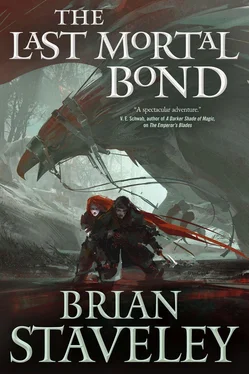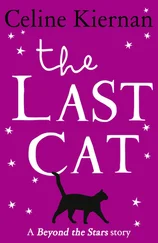Brian Staveley - The Last Mortal Bond
Здесь есть возможность читать онлайн «Brian Staveley - The Last Mortal Bond» весь текст электронной книги совершенно бесплатно (целиком полную версию без сокращений). В некоторых случаях можно слушать аудио, скачать через торрент в формате fb2 и присутствует краткое содержание. Год выпуска: 0101, ISBN: 0101, Издательство: Tom Doherty Associates, Жанр: Фэнтези, на английском языке. Описание произведения, (предисловие) а так же отзывы посетителей доступны на портале библиотеки ЛибКат.
- Название:The Last Mortal Bond
- Автор:
- Издательство:Tom Doherty Associates
- Жанр:
- Год:0101
- ISBN:9781466828452
- Рейтинг книги:5 / 5. Голосов: 1
-
Избранное:Добавить в избранное
- Отзывы:
-
Ваша оценка:
- 100
- 1
- 2
- 3
- 4
- 5
The Last Mortal Bond: краткое содержание, описание и аннотация
Предлагаем к чтению аннотацию, описание, краткое содержание или предисловие (зависит от того, что написал сам автор книги «The Last Mortal Bond»). Если вы не нашли необходимую информацию о книге — напишите в комментариях, мы постараемся отыскать её.
The Last Mortal Bond — читать онлайн бесплатно полную книгу (весь текст) целиком
Ниже представлен текст книги, разбитый по страницам. Система сохранения места последней прочитанной страницы, позволяет с удобством читать онлайн бесплатно книгу «The Last Mortal Bond», без необходимости каждый раз заново искать на чём Вы остановились. Поставьте закладку, и сможете в любой момент перейти на страницу, на которой закончили чтение.
Интервал:
Закладка:
Brian Staveley
The Last Mortal Bond
PROLOGUE
The dogs were closer.
Axta closed her eyes, unbraided the tightening knot of sound into the individual threads of canine baying: three dozen beasts a quarter mile off. She ran the angles-half a hundred of them-mapping the memorized terrain against long-established patterns for the propagation of sound.
“They have taken the bait,” she said. “Four groups.” She pointed back the way they had come, through the shattered boulders, thigh-high ferns, and the mossy trunks of the great, rotting pines. “There and there. There and there.”
Sos didn’t look. His eyes were fixed on a break in the trees, where the gleaming tower bisected the sky. If Axta had set her snare correctly, there would be fewer than forty humans left to guard the base of that tower, forty mortal women and men, and behind them, somewhere inside that inexplicable artifact, their gods, trapped in their mortal skins.
In the branches above, a jay notched four strident notes on the sky, then fell silent.
Axta unlimbered her bow, her few remaining arrows.
If she had known earlier what was happening here, if she had known that the gods of the humans would converge on this one point at this one time, she could have built a better, surer trap. But, of course, she had not known. She and Sos-on a different mission altogether-had stumbled across the convoy purely by accident. There was no time to go back, to try to bring to bear the feeble force of Csestriim that remained. There wasn’t even time to make more arrows.
“I will cover your attack,” she said. “But they have bows of their own.”
Sos nodded. “I will go where the arrows are not.”
The claim seemed implausible, but Axta had watched him do it before. She was the better tracker, the better general, the better stones player, but no one navigated battle’s labyrinth more readily than Sos. Alone, he had slaughtered the human garrison at Palian Quar. In the dark woods of the winter-long battle at First Pines, he held together the whole western flank of the Csestriim force, ranging through the trunks and shadows, carving apart his human foes day after day, week after week, until they crumpled, fled. Sos fought like a cartographer following his own perfect maps through a world of the blind, baffled, and lost.
He slid his twin swords from their scabbards.
Axta studied the moon-bright arcs.
Alone among the Csestriim, Sos had named his weapons: Clarity, he called one sword; the other, Doubt. She had watched him stand against three Nevariim once, thousands of years earlier, bearing those same blades.
“How do you tell them apart?” she asked. The weapons looked identical.
“One is heavier, one sharper.”
A few feet away, a butterfly landed on a fern’s serrated leaf, flexed indigo wings. Axta had spent a century, thousands of years earlier, in the study of butterflies. This species had escaped her catalogue.
“Which blade is which?” she asked, turning her attention back to the warrior.
“I have not decided.”
“Strange, to let the names come so untethered from the world.”
Sos shrugged. “It is what language does.”
Axta calved off a portion of her mind to consider that claim. Had there been more time, she would have pressed Sos on the point, but there was no more time. Behind the dogs’ baying she could hear the men with their blades. She turned back toward the tower.
“If we kill the gods today, we win. This is what Tan’is believes. If we carve them from this world, we carve away the rot that blights our children.”
Sos nodded.
The butterfly twitched into flight.
“What will you do,” she asked, “if there is no more war?”
In all his long years, the swordsman had kept no catalogue of butterflies.
“Prepare.”
“For what?”
“The next war.”
Axta cocked her head to the side, wondering how he could miss such a simple point. “If we defeat them here, today, the humans will be gone.”
Sos considered his own ancient blades as though they were strange in his hands, artifacts of unknown provenance, farming implements, perhaps, or instruments.
“There is always another war.”
* * *
He cut through the shocked human guards in moments, stepping from safety to safety as though he had studied the whole battle in advance, as though he’d spent a week charting his course through the bloody scrawl. Axta followed him-slit a woman’s throat, a bearded man’s hamstring-and then they were inside.
The Csestriim had studied the tower, of course. In the long years before the war, it had been empty, a gleaming, indestructible shell from some age antedating all recorded thought. It was empty no longer. The humans had built a massive wooden scaffold inside the space, huge pines notched and pegged one to the next, framework for a rough staircase spiraling up and up into the light.
Behind Axta, soldiers poured through the doorway bellowing, screaming. Sos, like a careful craftsman about his masterpiece, killed them. Axta started climbing. Somewhere up there, in the dazzling light, were the gods-Heqet and Kaveraa, Eira and Maat, Orella and Orilon-whose touch had polluted her people, whose corruption had turned the Csestriim into beasts like those broken creatures below, hurling themselves into Sos’s defense, parting their soft necks on his blades.
Axta climbed like an insect trapped in the sun’s amber, her constant movement a form of stillness. Why the gods had come here, she had no idea, nor why the humans had spent so much time building the scaffolding and the winding stair. As her hot heart shoveled blood through her veins, she tried to parse the probabilities. Reason bucked, buckled. Inference and deduction failed. At root, all knowledge required witness, and so she kept climbing.
When Axta reached the tower’s top, stepping from light into light, Sos was a pace behind her. Clouds scoured the sky’s blue bronze, polishing it smooth. On the tower’s wide summit, the gods-all six of them: Heqet, bull-shouldered and carved with scar; hiss-thin Maat; Orella and Orilon, one bone white, the other dark as storm; Kaveraa with her long fingernails; Eira, huge-haired, who might have been a girl-lay closed-eyed and still.
Wind fileted its invisible flesh on Sos’s naked blades.
Axta didn’t move.
Finally, the swordsman slipped one of the weapons into its sheath and knelt, pressing his fingers to Heqet’s neck, then to each of the others in turn.
“Dead,” he said finally, straightening from the corpses.
Dead . Axta revolved the notion in her mind, tested it as though it were late-winter ice. For decades and more these gods had walked the world inside their chosen human shells. Tan’is had managed to take two, to kill them, but the others had survived, had eluded all attempt at capture. The ongoing existence of the humans was predicated on that survival.
“No,” she said.
Sos arched an eyebrow.
“These are human bodies,” Axta continued, “but the gods that lived inside them are gone.”
The swordsman sheathed his other blade.
“Where?”
“Wherever it is they came from.” She studied the flawed, lifeless flesh. “Strange. Just when they were winning.”
Sos shook his head. “Not winning.”
Axta turned to him. “They’ve taken every important fortress, seized every road. There can’t be more than a few hundred of us left. Some of the humans have even learned to use the kenta .”
“They are not winning,” Sos said again. “They have won. This is why their gods have departed.”
They have won.
Axta studied the proposition for flaws, found none.
At her feet, the broken bodies that had carried those broken gods-just so much meat-were already turning to rot in the afternoon sun.
Читать дальшеИнтервал:
Закладка:
Похожие книги на «The Last Mortal Bond»
Представляем Вашему вниманию похожие книги на «The Last Mortal Bond» списком для выбора. Мы отобрали схожую по названию и смыслу литературу в надежде предоставить читателям больше вариантов отыскать новые, интересные, ещё непрочитанные произведения.
Обсуждение, отзывы о книге «The Last Mortal Bond» и просто собственные мнения читателей. Оставьте ваши комментарии, напишите, что Вы думаете о произведении, его смысле или главных героях. Укажите что конкретно понравилось, а что нет, и почему Вы так считаете.












